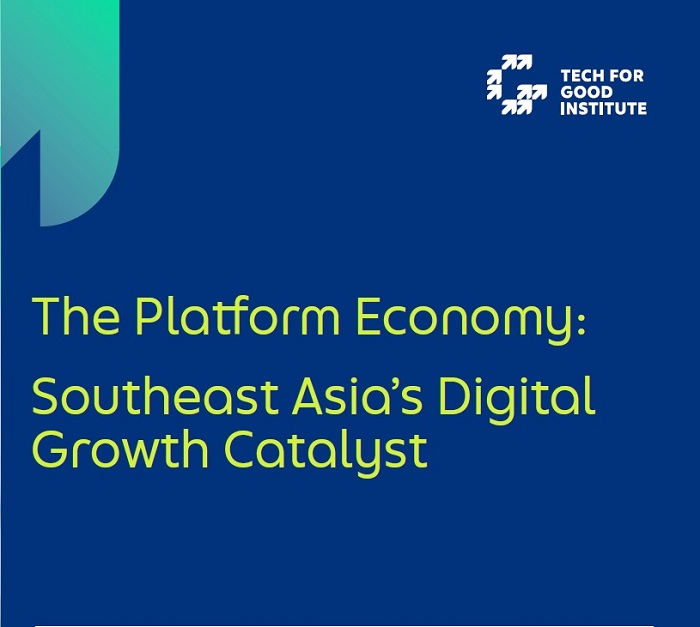Grab’s Tech For Good Institute Releases SEA Platform Economy Research with Bain & Co
By Digital News Asia November 11, 2021
- Inaugural report assesses impact of O2O platforms in Southeast Asia
- Building a concerted public-private partnership will ensure greater digital inclusion

The Tech For Good Institute (TFGI), a non-profit think-tank founded by Grab, hosted its first dialogue in Malaysia yesterday. TFGI was recently established to advance research and dialogue around harnessing the promise of technology for an inclusive access to the digital economy in Southeast Asia. Findings specific to Malaysia from TFGI’s inaugural “Platform Economy: Southeast Asia’s Digital Growth Catalyst” report, produced in partnership with Bain & Company, were also presented at the virtual event.
The report highlights Malaysia’s digital infrastructure and high digital adoption by consumers as important foundations for further digital economy expansion. 67% of Malaysia’s population has digital access through mobile phone subscriptions and 83% of this group have adopted digital payments through mobile wallets. Malaysian consumers are also digitally savvy, with a large majority at 83% already making purchases online.
However, to further unlock the potential of Malaysia’s digital economy, more needs to be done to support local micro, small and medium enterprises (MSMEs) to leveraging digital to improve business productivity and expand consumer reach, as well as to develop a robust tech ecosystem to help Malaysian startups seize global opportunities for venture capital funding and tap on tech talent. The report also calls for strong public-private collaboration to ensure inclusive and sustainable growth of the digital economy, including approaches to manage new economic and social changes, while continuing to facilitate innovation.
TFGI seeks to be the region’s thought-leadership platform for the public and private sector to jointly study, share expertise and discuss socio-economic trends driven by technology, in order to facilitate policy understanding and design in the digital age. This first dialogue brings together leading thinkers and practitioners to discuss the impact and role of digital platforms in Malaysia, and how to jointly collaborate to fully harness the potential of Malaysia’s digital economy.
The dialogue was graced by guest-of-honour Mustapa Mohamed, Minister in the Prime Minister’s Department (Economy). Other speakers included Mahadhir Aziz, CEO, Malaysia Digital Economy Corporation (MDEC), Iskandar Ismail, CEO, Malaysia Competition Commission (MyCC), Azita Azizan, Cofounder, Aerodyne and Prof Dr Noor Azlan Ghazali, Executive Director, Economic Action Council (EAC) and Professor of Economics, National University of Malaysia.
“Malaysia has made significant progress on its digital journey. Today, any Malaysian can supplement their household income part-time. Our graduates or unemployed are now able to access flexible, supplementary income, giving them a safety net to fall back to. Some Malaysians no longer visit wet markets, yet our pasar entrepreneurs thrive online. And for the first time in our nation’s history, a deaf or disabled driver could ferry a passenger, since navigation is now fully digital. As with all of these examples, I believe that there was always a will; we just needed to create a way”, said Sean Goh, Managing Director, Grab Malaysia.

Impact of O2O platforms in Malaysia
Key Malaysia-specific findings from TFGI’s inaugural “Platform Economy: Southeast Asia’s Digital Growth Catalyst” report include:
Consumers have embraced O2O platforms
- 7 in 10 have increased spend on platforms compared to 1-2 years ago. Majority agrees that platforms have brought a positive impact in their quality of life, such as greater convenience, better price comparisons, and a wider range of options as compared to their offline purchasing experiences.
- Malaysian consumers value access to choice, with at least 89% agreeing that they can access a wider range of products via platforms.
Platforms have a positive impact on MSMEs
- 85% of MSMEs surveyed said that platforms are critical for their future success.
- 82% of those surveyed highlighted that they can sell more to each customer through platforms and 72% indicated that it is more profitable to sell through platforms, compared to offline or in-store.
- 71% of surveyed MSMEs, in the e-commerce and F&B sectors, said their sales would have declined during Covid-19 if they had not leveraged platforms to conduct business during the pandemic.
- Platforms have created supplemental income opportunities for Malaysians with 73% of surveyed Grab driver-partners saying that their incomes have increased after joining the platform
Malaysia’s New Economy Progress Index (NPI) key findings
- Malaysia has made great strides in digital infrastructure development. 2 out of 3 of the population aged 18 and above have adopted mobile internet, and 1 out of 2 have used digital payments.
- More can be done to develop physical infrastructure such as increasing coverage of same-day delivery and mobile internet speed, particularly in non-urban region
- The country is still in the early stages of getting MSMEs online. MSME participation in the platform economy is still relatively low at 36%, and online food delivery and e-commerce contributes to only 12% of total retail sales in 2020.
Commenting on the findings, Aadarsh Baijal, Partner and Head of Southeast Asia’s Digital Practice at Bain & Company, said: “O2O platforms have spurred digital consumption in Malaysia with 70% of consumers spending more on O2O services compared to 2 years ago. Having bridged both physical and digital infrastructure gaps that have persisted in the region, these companies have become integral to the digital economy’s growth. To ensure the continued growth of O2O platforms, there needs to be a concerted public-private partnership to build greater digital inclusion and innovate solutions that can ensure sustainable growth of Malaysia’s digital ecosystem”.
To find out more about the Tech For Good Institute or download the full report, please visit here.


